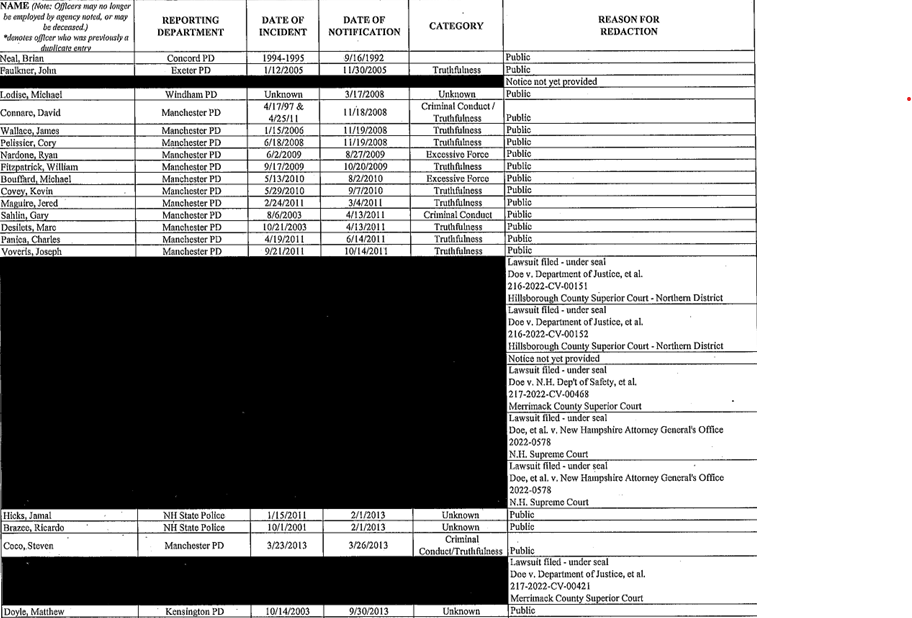The latest list of of police officers’ names on the Exculpatory Evidence Schedule, also called the Laurie List from July: https://www.doj.nh.gov/sites/g/files/ehbemt721/files/files/july-3-2024-ees-list.pdf
By DAMIEN FISHER, InDepthNH.org
CONCORD – Drunk driving convictions aren’t enough to land cops on the Laurie List, according to the New Hampshire Supreme Court, siding with a Manchester police officer who challenged his placement on the list for credibility-challenged law enforcement officers.
“[U]nder the circumstances presented, there is no reasonably foreseeable case in which the plaintiff’s off-duty, first-offense DWI charge would be admissible, we determine that, as a matter of law, the plaintiff’s inclusion on the EES is not warranted,” the justices wrote in a case order opinion issued last week.
The EES is the Exculpatory Evidence Schedule, also known as the Laurie List.
The officer, a John Doe defendant who worked for the Manchester Police Department, challenged his 2020 placement on the Exculpatory Evidence Schedule after a drunk driving arrest in New York. According to the court records, the officer was arrested for driving while intoxicated in New York in 2020. The officer resigned his job as a result, and two weeks later the city notified the New Hampshire Attorney General’s Office that Doe should go on the EES. Doe later pleaded guilty to the New York charge.
The officer won his challenge in Superior Court when Judge David Anderson agreed that one DWI conviction is not grounds for the EES. The New Hampshire Attorney General’s Office appealed the ruling, but the state Supreme Court ruled with Doe and Anderson.
The Attorney General’s Office conceded that Doe’s DWI conviction will not need to be automatically disclosed to defense attorneys in most instances, but argued that it is possible it will have to be disclosed in some future case, hence an EES placement is warranted.
But the state Supreme Court justices ruled that Anderson got it right when he found “[w]hile a DWI generally reflects poor judgment in the moment on [Doe’s] part, it bears no relation to the performance of his duties as a police officer let alone his credibility,” and “[the DWI] bears no potential relevance to a defendant’s guilt, nor would it serve as a basis to impeach the officer’s credibility.”
While the Doe v. Manchester case order ruling does not set any new legal precedent, it is in line with the precedent set last month when the justices sided with three former New Hampshire State Troopers who got caught lying about their traffic stops.
In that case, the Supreme Court found that the fact the three troopers admitted to submitting bogus activity logs that added phantom traffic stops in order to reach their minimum quotas 20 years ago is not enough to put them on the EES. The troopers claimed they did not intentionally lie with their activity logs, and therefore could not be accused of lacking credibility to testify in other cases.
The EES is meant to be a list of police officers with credibility problems serious enough that those records must be disclosed to defense attorneys in cases involving EES-placed officers. Typically lies in connection to duty, excessive force and other official misconduct, as well as convictions for criminal conduct, have been enough to get an officer on the list.
The New Hampshire Center for Public Interest Journalism, the publisher of InDepthNH.org, ACLU-NH, and a consortium of other news outlets filed a lawsuit against the attorney general seeking to make all of the police names on the list public (they were then all confidential). But, the ACLU and the other outlets agreed to drop their claims in exchange for a change in the law three years ago to make portions of the list public and allow officers to argue in Superior Court why their names should be removed before making them public with a number of cases still pending before the courts.
The New Hampshire Center for Public Interest Journalism public records lawsuit against the attorney general is still pending in Hillsborough County Superior Court-South.
Now, under that law, officers are able to challenge their placement on the list through anonymous lawsuits in Superior Court, and courts are trying to decide what counts as “exculpatory” or “potentially exculpatory” under the new legal framework.
Exculpatory evidence is evidence that favors the criminal defendant. If after conviction, a defendant finds out that a testifying officer with credibility issues in their confidential personnel file was not disclosed to him or her before trial, they can petition for a new trial.





